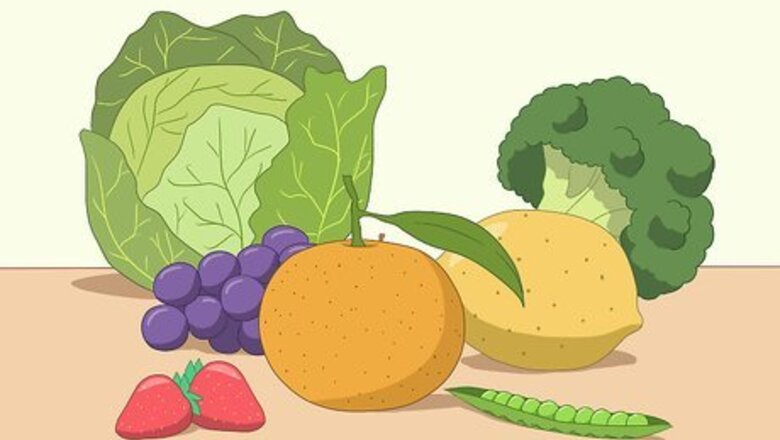
views
Add plenty of fruit and vegetables to your diet.
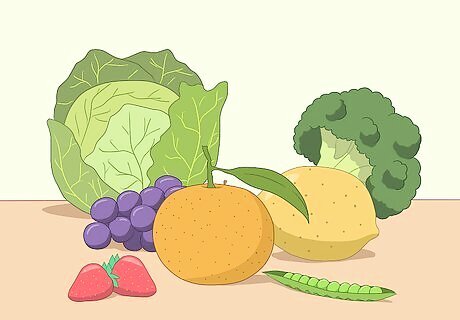
A diet higher in fruits and leafy green vegetables reduces your risk for fibroids and might shrink existing ones. Follow a healthy diet and build your meals around fruits and vegetables to see if this helps. The general health advice is to eat at least 1.5-2 cups of fruit and 2-3 cups of vegetables every day. Use this as your guideline to make sure you’re getting enough. Citrus fruits in particular lower your risk for fibroids. Try to include oranges, grapefruit, lemon, lime, and tangerines in your diet.
Eat more dairy for a good source of vitamin D, calcium, and magnesium.
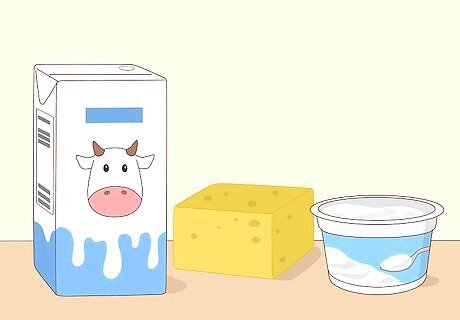
Some research shows that dairy products can heal fibroids. This suggests that vitamin D, calcium, and magnesium are beneficial for helping your body recover. Add more milk, cheese, and yogurt to your diet to experience these advantages. Have low-fat dairy products to cut fat out of your diet and avoid gaining weight.
Drink green tea for more antioxidants.
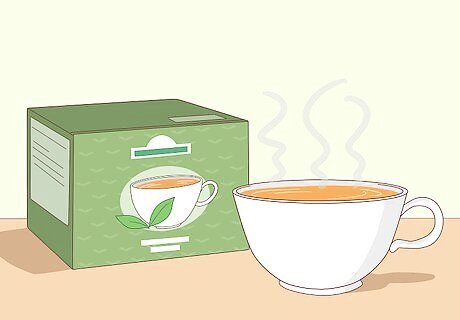
While all teas have antioxidants, green tea especially shows some success in treating fibroids. As an added bonus, a little caffeine from green tea could give you a boost. Try adding a few cups per day to your diet to see if your fibroids improve. Green tea is generally safe for use as long as you don’t have too much. The recommended amount is 2-3 cups per day, but up to 5 is safe. Remember that green tea has caffeine in it, so don’t drink it close to bedtime. Get a caffeine-free type so you can sleep.
Reduce your red meat intake.
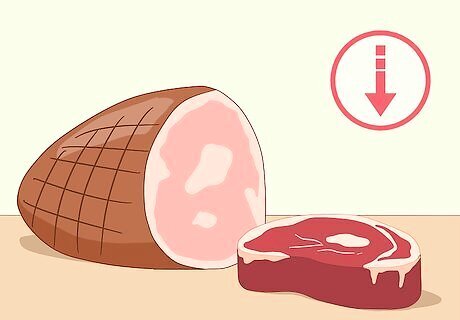
A diet high in red meat seems to put people at a higher risk for developing fibroids. If you eat red meat multiple times per week, then try to cut back. This might not shrink your fibroids, but it can prevent them from getting bigger and stop new ones from growing. White-meat poultry and fish are good replacements for red meat. The general advice to avoid heart disease and cancer is consuming no more than 3 red meat servings per week. This might work for you, but ask your doctor what the ideal portioning is.
Cut sugary foods and desserts out of your diet.
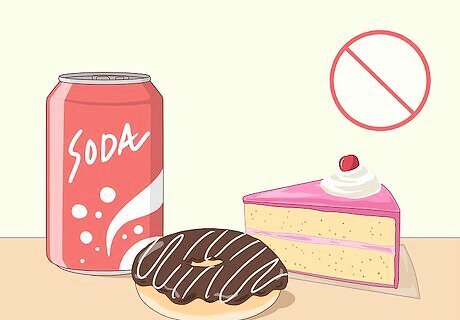
Processed sugar also seems to make fibroids worse. This might be because sugar causes more insulin and estrogen to circulate in your body. Try reducing your daily sugar intake to prevent more fibroids from growing. Desserts and soda are a big source of sugar, but they aren’t the only foods with added sugars. Check all the nutrition labels when you’re buying food. You might be surprised how much sugar some foods have. The recommendation is to have no more than 25 g of added sugar per day, so keep your intake below this level.
Stay active to reduce your risk for fibroids.
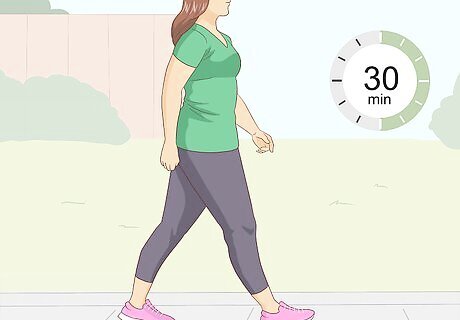
Athletic people tend to develop fibroids less often than those who don’t exercise. If you aren’t very active, then try adding more exercise to your daily schedule. Exercise also releases hormones that reduce pain, so you could make yourself more comfortable with regular exercise as well. As a general guide, the recommendation is to get 150 minutes of exercise per week. You can break this up and get 30 minutes on 5-7 days during the week. You don’t have to exercise intensely. Even a daily walk or some yard work could make a big difference.
Lose weight if you have to.
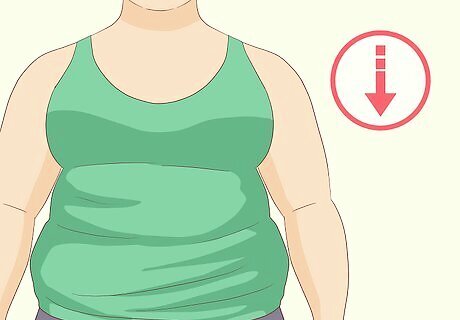
People with excess weight are about 2-3 times more likely to develop fibroids. Being overweight can also make the pain from fibroids worse. Talk to your doctor to decide on the ideal weight for you, then design a diet and exercise routine to reach that weight. Don’t try to lose weight fast with a crash or extreme diet. These are dangerous and unsustainable, and many people regain weight once they stop an extreme diet.
Control stress to avoid other health problems.
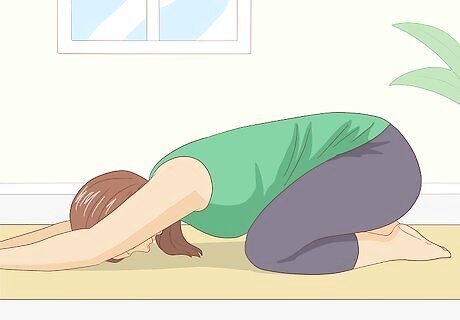
While stress doesn’t directly cause fibroids, it may play a role in creating them. Specifically, stress can cause weight gain and stimulate the production of the hormone cortisol, both of which could trigger fibroids. If you regularly feel stressed out, then taking some steps to relax in your daily life could help treat your fibroids. Some wellness exercises like yoga, meditation, and deep breathing are good for your mental health and could reduce stress. Try spending 15-20 minutes each day on one of these activities. Doing things you enjoy is good for reducing stress as well, so make some time for your hobbies and interests each day.
Limit your drinking.
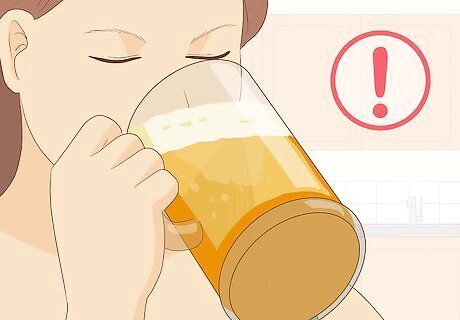
Alcoholic drinks, particularly beer, raise your risk of developing fibroids. Averaging more than 1 drink per day could trigger fibroid growth, so it’s best to keep your drinking below that level. An occasional drink is fine, but don’t drink every day.
Take vitamin D supplements to shrink the fibroids.
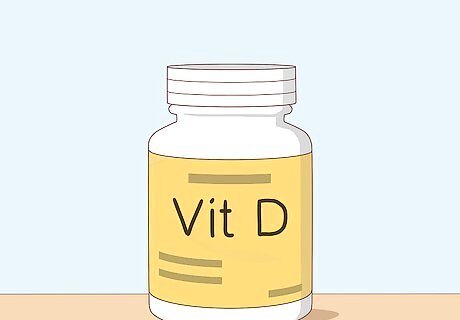
Some studies show that a high vitamin D dose can reduce fibroid size. These findings are preliminary, but could be a potential treatment. Try taking a daily vitamin D supplement to see if this helps. You would need a pretty high dose of vitamin D to shrink your fibroids. Since the daily recommended dose is 15 mcg, ask your doctor if taking higher doses is safe first. You could also get more vitamin D from your regular diet
Use green tea extract as a treatment.
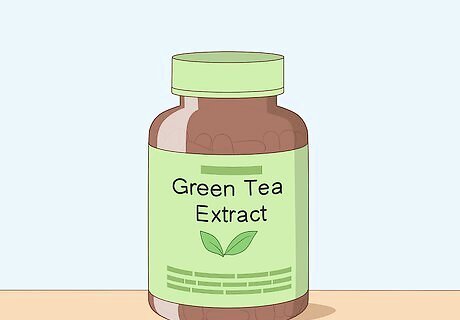
While drinking green tea can help, a concentrated green tea supplement seems to work as well. Try taking 800 mg of green tea extract per day for 3-4 months to see if it helps. Green tea extract has caffeine as well, so be careful about taking it near bedtime. It’s best to have it earlier in the day. Green tea extract could interact with blood thinners and beta-blockers, so ask your doctor if this is a safe treatment before you use it.
See if Chinese herbal medicine works.
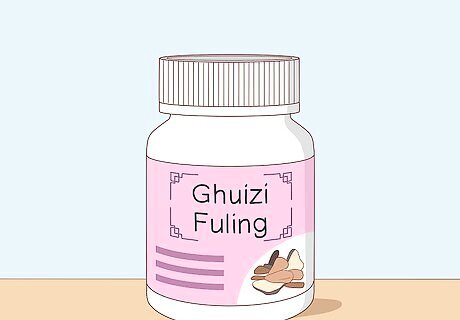
Certain Chinese herbal mixtures show some success in reducing fibroids. The herb formula made fibroids smaller in a few small studies, so you can try it for yourself. These were relatively small studies with inconsistent review methods, so it’s not a verified remedy. Ask your doctor before trying this treatment.
Reduce excess estrogen with chasteberry.
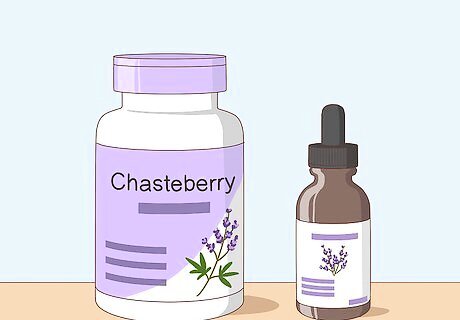
High estrogen levels could cause fibroids. Chasteberry supplements could reduce excess estrogen and prevent fibroids from growing. You can take the supplement in pill or liquid form. The dosage varies for different supplement brands. For tablets, a common dose is 20-40 mg per day, and for liquid a common dose is 40 drops (about 2 ml) per day.
Try acupuncture.
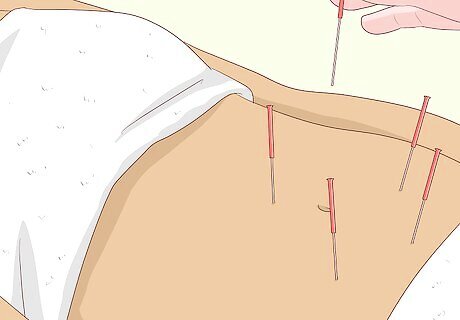
Acupuncture may help relieve fibroid pain. While there’s no evidence that acupuncture helps specifically treat fibroids, it’s still widely used and some people find that it relieves their pain. Try this out if you’re feeling pain or discomfort with your fibroids. Always visit a licensed and experienced acupuncturist to ensure you’re getting quality treatment.


















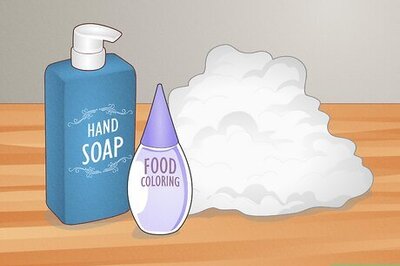

Comments
0 comment